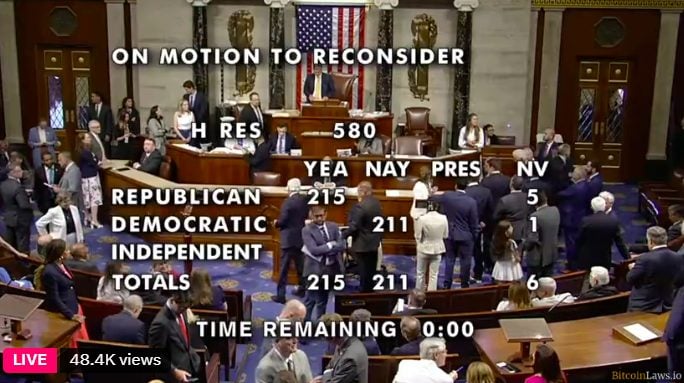President Trump on Tuesday intervened to secure support from GOP holdouts who initially blocked the bills' advancement.

Key Takeaways
- The US House of Representatives cleared a procedural hurdle for key crypto bills after an initial setback.
- With this result, the GENIUS Act, which would establish a proper framework for regulating stablecoins, is poised for final debate and votes on the floor.
The US House of Representatives on Wednesday passed a procedural vote advancing two major crypto bills, the GENIUS and GENIUS Acts, reviving “Crypto Week” momentum after an initial failed attempt. The motion passed 215 to 211.
 Source: @Bitcoin_Laws
Source: @Bitcoin_LawsThe successful vote enables potential floor debate and final votes on the GENIUS Act for stablecoin regulation and the Clarity Act, which aims to establish regulatory oversight of digital assets.
The initial procedural vote failed Tuesday with a 196-223 count before House leadership secured passage on a second attempt today.
The GENIUS Act (Guiding and Establishing National Innovation for US Stablecoins), previously approved by the Senate, would establish federal standards for dollar-backed stablecoins, requiring full collateralization with US dollars or high-quality liquid assets. The bill mandates annual audits for issuers with market caps exceeding $50 billion and sets rules for foreign-issued stablecoins operating in the US.
The Clarity Act would divide oversight between the SEC and CFTC, require financial disclosures from retail-facing crypto platforms, and mandate the separation of customer and corporate funds.
While the GENIUS Act could reach President Trump’s desk this week, the Clarity Act still requires Senate approval.
The procedural advancement follows Republican lawmakers’ and the Trump administration’s push to establish digital asset regulations before the August recess. During a recent Oval Office meeting originally scheduled to discuss crypto legislation, Trump showed House Republicans a draft letter to terminate Federal Reserve Chair Jerome Powell, according to The New York Times.
The House is expected to begin debating both bills within 24-48 hours, with a final GENIUS Act vote possible by Thursday evening.
This is a developing story.
Disclaimer
 4 hours ago
1
4 hours ago
1
















 English (US) ·
English (US) ·